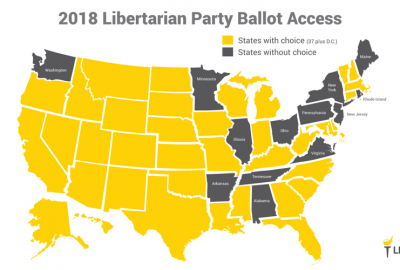Candidate Recruitment
Candidate Recruitment
By Sam Goldstein
Updated in October 2015
1. Organize
 At least one year prior to Election Day (or longer depending on ballot access laws in your community), form a Candidate Recruitment Committee consisting of 3-4 hard workers who will dive right into the task of finding people who are willing to run for office on the Libertarian ticket.
At least one year prior to Election Day (or longer depending on ballot access laws in your community), form a Candidate Recruitment Committee consisting of 3-4 hard workers who will dive right into the task of finding people who are willing to run for office on the Libertarian ticket.
Determine which offices are up for election by contacting your local and/or state election board and make sure you know your ballot access laws in detail. The old parties change these laws, often without any official notification to minor parties.
Depending on those ballot access laws and the strength of your local party, determine those offices for which you want to recruit candidates. Obtain lists of current and recently expired members from your state party, then match those potential candidate with your list of elective offices.
2. Set Goals
Here we come to the age old LP question of Quantity v Quality. Do you want to fill the ballot with LP candidates even though some may be inactive or paper candidate or do you want to run a limited number of high quality, active candidates?
You have only a limited time to contact potential candidates so be sure to step on the gas! Know your filing deadlines and get to work!
3. Ask people to run for office
Here are some truths about recruiting candidates:
People are flattered to be asked. Send an initial contact letter to your potential candidates outlining what offices they might want to consider and how they would help the party retain visibility and viability by consenting to run. Tell them the great Libertarian lie “we won’t ask you to do anything much” to reduce resistance.
People want to help the party and this is one of the best ways they can do so for free.
Follow up on your initial letter within a week to 10 days by having your Committee make phone calls to your potential candidate. A sample call script is included below.
4. Vet your candidates
Before committing candidates to paper, find out some basic information about them that may be good to know in a campaign season. In a way that you can comfortably and tactfully do so, ask them, “Because you will be representing the Libertarian Party in a public fashion through November, is there anything happening in your life that you’d be embarrassed to read about in the newspaper?” Believe it or not, even paper candidates will be watched and pending lawsuits or criminal cases make good headlines for reporters. If this person has had a criminal conviction, that’s also a useful thing to know. We are really trying to avoid seeing “Libertarian Fields Felon For City Council” in the headlines
Consider a formal Candidate Questionnaire that collects basic contact information, internal LP membership/activity information and a range of policy questions pertinent to the office being sought.
5. Get your candidates on the ballot
The Candidate Committee’s work does not end with your prospective candidate agreeing to run for office. You must then work with your declared candidates to file paperwork necessary for them to appear on the ballot in November. That may be as simple as, in Indiana, having the State Chair and/or the County Chair (along with the Secretary) sign the correct form and submit it to the appropriate authority prior to the filing deadline or as difficult as having to spend thousand s of dollars getting petition signatures. Since you began this effort a full year before Election Day you should have this well in hand with advance planning of all that is necessary.



